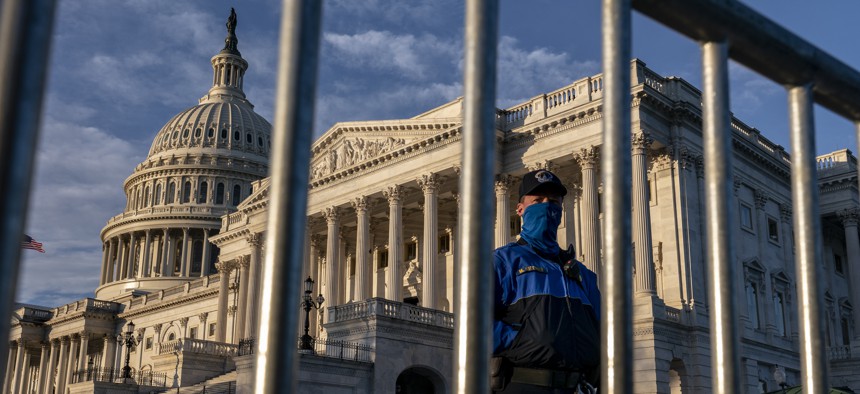With the Election Over, Will Covid Stimulus Actually Move Forward?

The Senate side of the U.S. Capitol is seen on the morning of Election Day, Tuesday, Nov. 3, 2020, in Washington. AP Photo/J. Scott Applewhite

Connecting state and local government leaders
Sen. Majority Leader Mitch McConnell said Congress needs to approve a coronavirus aid package before the end of the year.
Senate Majority Leader Mitch McConnell on Wednesday said approval of another coronavirus stimulus package before the end of the year would be his top priority when the Senate reconvenes next week. Funding for state and local governments, a sticking point in prior negotiations, could also be considered, he said.
“We need another rescue package,” McConnell said during a press conference in Kentucky, where he won reelection. “Hopefully the partisan passions that prevented us from doing another rescue package will subside with the election. And I think we need to do it and I think we need to do it before the end of the year.”
The Senate will be back in session Monday, and McConnell said a stimulus deal and omnibus spending bill to keep the government open will be the focus in the coming months. He had earlier suggested that a deal was not likely until early next year.
Talks over another possible coronavirus stimulus bill had stalled for months ahead of the election as Senate Republicans, House Democrats and the Trump administration were unable to come to agreement on a deal. Disagreement about a potential package continued, even as unemployment figures suggested a slow down in the economic recovery. Local and state officials also lobbied for more help, saying they are still spending money to respond to the pandemic, while tax revenues shrank during the economic downturn.
State and local governments will still need financial support even if the coronavirus pandemic subsides over the winter, said Mike Leachman, vice president of state fiscal policy at the Center for Budget and Policy Priorities. State and local governments have furloughed or laid off 1.2 million workers, and are likely to face budget shortfalls exceeding $500 billion over the next two years, he said.
“The economic decline we’ve seen this year is entirely due to the pandemic,” Leachman said. “That’s why state revenues are down and that’s why they need aid.”
But with Republicans less receptive to the idea of providing financial assistance to state and local governments, the results of the election will have implications for any future aid package.
As the vote count in battleground states continued Wednesday, Wisconsin and Michigan were called for Democratic presidential candidate Joe Biden, making it more likely he would beat President Trump. Republicans appeared likely to retain control of the Senate, while Democrats kept the House.
But exactly how those dynamics will play out remain uncertain. In the days leading up to the election, Trump expressed renewed support for more financial aid to help people and businesses affected by the pandemic. It isn’t clear what the president’s position will be if he is voted out of office and asked to consider a new package during a lame duck session.
Before the election, House Speaker Nancy Pelosi also emphasized that she remained far apart from the White House on key points, including financial aid for state and local governments.
McConnell said Wednesday he’d be open to the possibility that state and local assistance is included in a stimulus bill, but he said funding may need to be curtailed to localities that can demonstrate certain levels of need in order to qualify.
“It’s a big item for Democrats and it is not something my side is very fond of because it’s hard to figure out who really needs it and who doesn’t,” McConnell said.
One possibility for approving stimulus initiatives could be to attach measures that both sides agree on to a must-pass spending bill, said G. William Hoagland, senior vice president of the Bipartisan Policy Center. A stopgap spending bill approved in September only keeps the federal government funded through Dec. 11.
“One way or another, something will have to be done in the lame duck session just to keep the government operational,” Hoagland said.
A federal extension of unemployment benefits and funding for Covid-19 testing, tracing and vaccine distribution could all be likely measures for including in a government funding bill, he said. But because funding for state and local governments remains a controversial topic in Congress, Hoagland said it seems unlikely to be tacked on to other legislation.
Andrea Noble is a staff correspondent with Route Fifty.

NEXT STORY: Rejecting the ‘Fair Tax’ Ballot Measure, Illinois Voters Decide to Keep a Flat Income Tax




